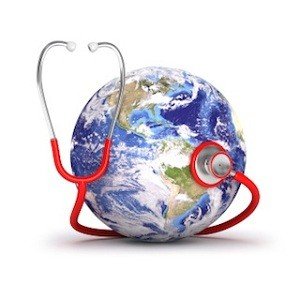
Borders between countries are purely human invention and abstraction – they exist for us because we believe in them. But for infectious diseases there are no borders – they travel freely from nation to nation, no matter how hard we try to prevent it. A disease that appears in one country cannot be considered only that particular country’s problem – it is a problem of the entire world, as current situation with Ebola virus clearly shows.
Infectious diseases cannot be ignored – their impact is not limited to disrupting economic and social stability. The entire humankind can be wiped out if a sufficiently lethal and contagious new infection emerges and is not kept in check during the initial stage of its spread. That was precisely the reason for the creation of CORDS (Connecting Organizations for Regional Disease Surveillance).
It was founded in 2009 and intended as a platform for a world-wide international disease surveillance network. Right now regional disease networks are pretty much autonomous and communication between them leaves much to be desired, which leads to slower response to new threats, than necessary. CORDS is aimed to improve this situation, bringing regional networks together, uniting them into one universal network that would swiftly and effectively react to any potential pandemics and biological weapon threats.
With the help of CORDS and under the aegis of World Health Organization regional networks are supposed to share information, experience and expertise to develop and prepare new, more effective and universal response patterns to the potential outbreaks of new and old diseases.
The best tools and practices are to be shared among the healthcare specialists across the world, and their combined experience is to be used in preparation of case studies, education courses, innovative approaches to disease treatment and general technological data. As a result, each new outbreak is to be met in a cohesive way, by unifying the efforts of the entire human race.
However, CORDS is well aware of the fact that certain Third World regions, stricken with poverty, ignorance and civil strife are much more susceptible to infectious diseases. What’s more, they are not simply in greater danger, in their current state they represent a threat to the entire world, because a new lethal disease may emerge in one of such regions and remain unnoticed for a considerable amount of time. And after it is noticed it may turn out to be too late to effectively counteract it.
That is why one of the major efforts initiated by CORDS is establishment of regional partnerships in Southern Africa, Middle East and South-Eastern Asia, to provide them with the resources necessary for early detection of new pathogens.
All this taken into account, CORDS was and is a strictly non-governmental organization, with its funding coming from the Rockefeller Foundation, the Bill & Melinda Gates Foundation and the Skoll Global Threats Fund. It follows its own vision of how global health should be achieved, promoting the concept of One Health – i.e., holistic approach to fighting the disease, based on the assumption that human, animal and environmental health are all interconnected, and thus it’s necessary to work on these three spheres simultaneously.
This approach seems to be more and more logical, as recent years clearly show that animal health is just as serious global health issue as our own. New epidemics most often seem to be spreading via animals, both domesticated and wild, and without understanding the principles that rule their emergence we cannot hope to battle those that pose threat to humans. Hopefully, CORDS can play a vital role in it.
